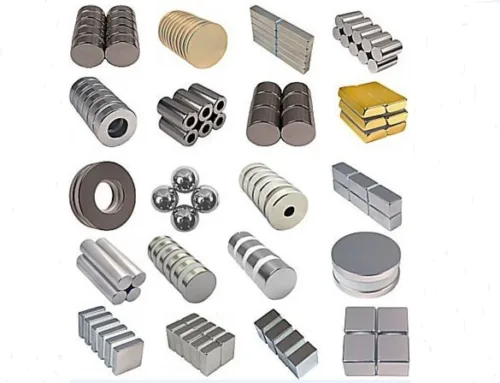If you’ve ever wondered why magnets are so crucial in electronics and computers, you’re not alone. These tiny but powerful components play a massive role in everything from the speakers in your smartphone to the hard drives that store your data. Understanding the types of magnets used in electronics and computers, their materials, and their specific functions can give you a real edge—whether you’re a tech enthusiast, engineer, or product developer.
In this post, you’ll discover how different magnetic materials like neodymium and ferrite make devices more efficient and reliable. Plus, we’ll explore why choosing the right magnet supplier matters for product performance and innovation. Ready to unlock the essential role of magnets in today’s high-tech world? Let’s dive in and see what makes these magnetic materials indispensable.
Understanding Magnets and Magnetic Materials
When you think about magnets used in electronics and computers, what comes to mind? Are all magnets the same? Not really. Let’s break it down simply.
What Are Magnets and Their Types
Magnets are materials that produce a magnetic field, which can attract or repel certain metals. There are three main types of magnets you’ll encounter in electronics:
- Permanent magnets: These hold their magnetic properties without needing any power. Examples include Neodymium and Ferrite magnets.
- Electromagnets: These only become magnetic when an electric current runs through a coil wrapped around a core. They’re common in certain electronic switches and motors.
- Rare earth magnets: These are super-strong permanent magnets made from rare earth elements like neodymium and samarium. They’re widely used where high performance is needed in small sizes.
Key Magnetic Materials in Electronics and Computers
Several materials make up these magnets, each suited to different roles:
| Material | Common Use | Highlights |
|---|---|---|
| Neodymium | High-performance magnets | Very strong, compact, ideal for mini electronics |
| Ferrite | Speakers, motors | Cost-effective, good corrosion resistance |
| Alnico | Sensors, some motors | Good thermal stability, less powerful but durable |
What Makes Magnetic Materials Suitable for Electronics
Not all magnets cut it for sensitive electronic applications. Here’s what matters most:
- Strength: Strong magnetic force ensures efficient operation, especially in compact devices.
- Thermal stability: Electronics generate heat. Magnets must keep their properties steady under high temperatures.
- Corrosion resistance: Dust, moisture, and environmental factors can damage magnets. Materials like ferrite resist corrosion well, extending device life.
Understanding these basics helps when you want reliable, long-lasting magnetic parts in electronics and computer hardware. In the next sections, I’ll show you how these magnets actually power everyday devices and the tech behind them.
Applications of Magnets in Electronics
Magnets play a key role in many everyday electronic devices. In speakers and microphones, magnets work with coils to create and detect sound. The magnetic field moves the speaker cone to produce audio or picks up sound vibrations in microphones. This is why strong, reliable magnets like neodymium magnets are common here.
In electronic devices, electric motors and actuators rely heavily on magnets. These motors use magnetic forces to drive mechanical parts, powering things like fans, drives, and robotic arms with precision and efficiency.
Magnetic sensors, especially Hall effect sensors, are crucial for detecting magnetic fields and translating them into electronic signals. You’ll find these sensors in smartphones, automotive systems, and industrial electronics, helping with position sensing, speed detection, and current measurement.
Magnets are also at the heart of wireless charging and inductive power transfer systems. Here, magnets help create magnetic fields that transfer energy through air gaps – no cables needed. This technology powers everything from smartphones to electric toothbrushes, making charging easier and cleaner.
Together, these uses highlight why magnets are vital components in modern electronics, driving performance and enabling smarter, more compact devices.
Magnets in Computers Critical Components and Functions
Magnets play key roles in many computer parts we use every day. Hard disk drives (HDDs), for example, rely heavily on magnets to read and write data. Powerful rare earth magnets create the magnetic fields needed to store information on spinning disks, making data storage fast and reliable.
Cooling fans inside computers also depend on magnets—brushless motors use strong magnets to keep the fan running quietly and efficiently, preventing overheating and boosting overall system life.
Printers and scanners have magnetic components too. These magnets help position moving parts accurately, ensuring sharp prints and clear scans every time.
On the cutting edge, magnets are now part of emerging technologies like solid-state drives (SSDs) and magnetic RAM (MRAM). While SSDs don’t use traditional magnetic storage, magnets play a role in related electronics. MRAM is a promising memory tech that stores data magnetically, offering faster speed and better durability compared to standard memory chips.
In short, high-quality magnets are critical for computer hardware performance—from storage to cooling to printing—making them essential materials in electronics manufacturing.
Why Material Quality Matters NBAEMs Role in Providing Premium Magnetic Materials

When it comes to magnets used in electronics and computers, material quality is everything. The strength, consistency, and durability of magnetic materials directly affect how well electronic devices perform and how long they last. Low-quality magnets can lead to weak performance, overheating, or even early failure of critical components like hard drives, sensors, and motors.
NBAEM stands out as a trusted supplier of high-performance magnets from China, known for strict quality control and advanced manufacturing techniques. They provide premium magnetic materials like neodymium and ferrite magnets that meet the demanding benchmarks of the electronics industry here in the United States.
Beyond standard products, NBAEM offers customization options to fit specific electronics needs, whether it’s for stable thermal properties, corrosion resistance, or compact size. This flexibility helps manufacturers build reliable devices that perform consistently in real-world conditions.
Key benefits of NBAEM magnets for electronics include:
- Exceptional magnetic strength for efficient device operation
- Consistent material quality to ensure durability and reliability
- Customizable sizes and coatings tailored to the electronics industry
- Reliable supply chain supporting local US manufacturers
Choosing NBAEM means partnering with a supplier who understands the unique demands of magnets in computers and electronics, ensuring products meet both performance and longevity expectations.
Trends and Innovations in Magnetics for Electronics and Computing
The world of magnets in electronics and computing is evolving fast. One big trend is miniaturization—making magnets smaller but still powerful enough for compact devices like smartphones, wearables, and portable gadgets. This helps electronics stay lightweight without losing performance.
Another important shift is the focus on rare-earth magnets, especially neodymium. These magnets pack a lot of strength into a tiny package, which is why they’re in demand for high-performance applications. However, the supply chain for rare-earth materials faces challenges, including sustainability concerns and geopolitical risks. As a result, companies are investing in recycling efforts and developing alternatives to reduce dependency on scarce resources.
Lastly, with the rise of the Internet of Things (IoT) and smart electronics, the need for reliable, efficient magnets is growing. Magnets are essential in sensors, wireless charging systems, and micro-motors found in smart home devices, wearables, and connected industrial equipment. This expanding market pushes innovation to deliver magnets that are not only smaller and stronger but also more energy-efficient and environmentally friendly.
How to Choose the Right Magnet Supplier for Your Electronics Needs
When picking a magnet supplier for electronics, a few key things matter most:
- Product Quality: Reliable performance and consistency are critical. Quality magnets mean your electronics run smoothly and last longer.
- Supply Reliability: You need a supplier who can deliver on time and in the quantities you require, avoiding production delays.
- Customization Capability: Sometimes off-the-shelf magnets won’t cut it. A supplier that offers tailored sizes, shapes, and strengths can make all the difference.
NBAEM stands out as a trusted partner both in China and globally because they check all these boxes and more. They specialize in high-performance magnetic materials like neodymium and rare earth magnets, essential for electronics and computer hardware. Plus, NBAEM’s strong manufacturing processes mean you get consistent quality and durable products.
Need samples or want to start a custom order? NBAEM is easy to contact and responsive to inquiries, helping US customers get exactly what they need—fast and hassle-free. For electronics projects where magnet quality can’t be compromised, NBAEM is a go-to supplier you can count on.





[…] These real-world examples show that magnets are more than just a part of traditional electronics—they are vital enablers of smarter, faster, and more reliable AI technologies. To learn more about different types of magnets used in electronics and AI, check out magnets used in electronics and computers. […]
[…] Electronics: They power everything from hard drives to speakers and wearables, offering compact, efficient magnet performance (see magnets used in electronics and computers). […]